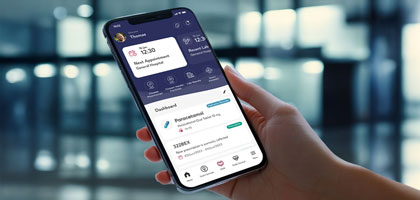
Blog
The Importance of Data Aggregation in Healthcare
Vast amounts of data are being generated from different sources like electronic health record (EHR) systems, wearable devices and insurance claims in today’s healthcare industry. Data aggregation, which is gathering and combining data from diverse sources into a unified format in short, transforms health data into actionable insights. In this blog, we explore the working mechanism and importance of healthcare data aggregation and explain the challenges it encounters.
What is Data Aggregation in Healthcare?
Data aggregation in healthcare is the process of collecting, organizing and combining data from various healthcare systems and sources. This process also involves formatting the data into a single dataset for effective analysis. The main aim of the process is creating a comprehensive and accessible view of critical health data like patient information for better decision-making and care planning.
Health data comes from multiple points; EHR systems involve detailed patient information such as laboratory results, reports, diagnoses, treatment plans, medications, vaccinations, hospital appointments and more. In addition to these systems, mobile health applications and wearable devices like fitness trackers and health monitoring devices offer critical data from heart rate to physical activity. Also, insurance companies provide financial and treatment-related patient information. Aggregating the diverse data allows for a holistic understanding of a patient’s health, enabling healthcare providers to offer more precise and personalized care. Beyond the main benefit for patients, this wealth of unified data equips healthcare providers and health professionals with powerful analytical insights; it allows them to identify critical trends, understand complex patterns across the population and make more informed clinical decisions.

How Does Data Aggregation Work in Healthcare?
Data aggregation in healthcare follows a systematic process involving the below steps:
- Data Collection: Firstly, data is gathered from various healthcare systems. As emphasized above, EHR systems, wearable devices, mobile health apps and insurance claims are examples of these systems.
- Data Integration: After the first step, the collected data is integrated into a centralized repository. Cloud storage and specialized healthcare data platforms are often preferred. This step enables data from various sources to be used together.
- Data Standardization: Healthcare data can be in different formats, units and structures. For example, one system may record blood pressure in millimeters of mercury while another one uses centimeters of mercury for the pressure. Standardization eliminates these differences by converting all data into a uniformed format, making it easier to analyze.
- Analysis and Insights: Once aggregated, the data can be analyzed through various tools and algorithms. Data analysis uncovers patterns, trends and insights. For instance, doctors can predict potential health threats and interfere earlier with the combination and analysis of data from a patient’s EHRs and wearable devices.

Why is Data Aggregation Important in Healthcare?
Data aggregation offers a lot of benefits to healthcare authorities, healthcare providers, health professionals and patients:
- Improved Patient Care: Thanks to aggregated health data, healthcare providers access a comprehensive view of a patient’s health, leading to better decision-making processes. For instance, doctors can create personalized treatment plans according to patients’ health situations by focusing on aggregated data on medical history, lab results and so on.
- Operational Efficiency: Healthcare facilities can optimize their operations through aggregated data; by using the data, they can identify inefficiencies, avoid redundant procedures and improve resource allocations, ultimately lowering costs. For example, hospitals can optimize staffing and equipment usage by aggregating patient data across different departments.

- Informed Decision-Making: Medical data aggregation helps healthcare professionals, administrators and policymakers to make data-driven, evidence-based decisions, increasing care quality, treatment effectiveness and overall health information management. For instance, aggregate data in healthcare can be used to analyze treatment outcomes from various patient groups and determine which approach for a particular disease results in better patient recovery rates. Aggregated health data-driven decision-making can improve healthcare management efficiently.
- Predictive Analytics: Data aggregation in healthcare can support the forecasting of future health trends and potential threats. For example, healthcare providers can use aggregated data from wearable health devices and medical histories to detect early signs of diseases. With predictive analytics through aggregated health data, better management of chronic conditions and timely interventions before medical emergencies occur can be possible.

Challenges in Data Aggregation in Healthcare
After answering the question of ‘’What is aggregate data in healthcare?’’ and explaining its benefits, it is also important to focus on the difficulties encountered in data aggregation:
- Data Privacy and Security: Healthcare data has a sensitive structure and protecting patient privacy and security is crucial. Many countries have data protection regulations such as the EU’s GDPR and the US’ HIPAA to safeguard sensitive healthcare information. Data aggregation from different sources may introduce the risk of unauthorized access or breaches, damaging trust in healthcare systems. For example, health data breaches like the hacking of an electronic patient record system or a clinical information system can disclose critical patient information, leading to legal and reputational issues.
- Data Quality and Consistency: To benefit from aggregate health data, the data must be accurate and consistent. Poor-quality data such as incomplete or outdated records may lead to incorrect conclusions and impact patient care negatively. For example, missing allergy information from an aggregated dataset can result in the prescription of a medicine which causes a dangerous allergic reaction.
- Interoperability: Incompatible formats of different healthcare systems make seamless data exchange difficult. Achieving interoperability between these systems is a significant challenge in data aggregation. For instance, differences in EHR systems complicate accessing patients’ data, causing delays in care and repeated tests. Consequently, both patients and healthcare facilities lose time, money and trust due to the differences.

Conclusion
By considering the importance of data aggregation in healthcare, we offer our Clinical Viewer 360 which is an interoperability product from our Health Information Exchange (HIE) Suite. This technology enables healthcare professionals to access EHRs from diverse health systems through a single platform. It provides integrated critical information like a patient’s current health status, previous treatments and medication history. Clinical Viewer 360’s centralized structure improves treatment decisions and leads to more accurate and faster interventions in patient care.
In addition to Clinical Viewer 360, we deliver Enterprise Master Patient Index (EMPI) which consolidates identity and reference data from multiple health information systems, national identity databases and external data sources into a single, consistent and reliable reference record. As one of the four core components of our HIE Suite, this product optimizes health data management and ensures better interoperability between healthcare systems.
While developing our information technologies, we take into consideration both the benefits and challenges of data aggregation. We take necessary measures to protect sensitive health data and make seamless data sharing possible. Our interoperability and security-focused approach builds a foundation for effective health data utilization.
Let’s shape the future together through the power of health data, as always!








